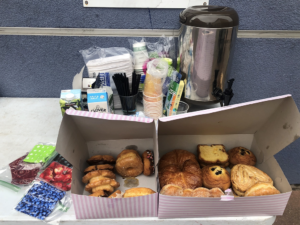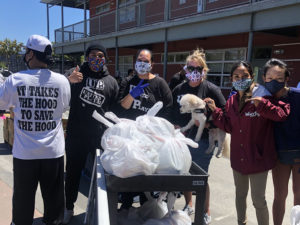As the founder of an IT company, Steve Walker is doing his best to give back to the community, but never thought about the issue behind hunger until recently. Located in SOMA, a microcosm for poverty and income inequality, his company Cobaltix is right around the corner from the Bessie Carmichael Elementary School Pop-up pantry. Steve knew he needed to find creative ways to help the community, which sparked the idea of making and donating handmade cloth masks in his neighborhood.
 So, one day in April, after seeing the line at the Pop-up pantry extending around the block, Steve Walker decided to follow the line to the entrance and pass out face masks to staff and volunteers. Soon he extended it to participants who didn’t have one on their faces. Not long after, he donated so many that we were even able to share them with the Food Bank’s pantry network, including pantries that serve the unhoused population and need clean masks.
So, one day in April, after seeing the line at the Pop-up pantry extending around the block, Steve Walker decided to follow the line to the entrance and pass out face masks to staff and volunteers. Soon he extended it to participants who didn’t have one on their faces. Not long after, he donated so many that we were even able to share them with the Food Bank’s pantry network, including pantries that serve the unhoused population and need clean masks.
But Steve knew he could be doing so much more. Once he started familiarizing himself with the growing need and engaging with the community, he decided that there were other items he could be giving out. One week, he donated two hand carts and coffee. Since then, he and his staff also started bringing coffee and breakfast items such as pastries, bagels, granola bars, and fruit each week for staff and volunteers.
We spoke with Steve about his firm’s contribution and how they’re expanding their help to other pop-ups.
Food Bank: As an IT company, why did you start making masks in the first place?
Steve Walker: Cobaltix is currently doing well, and we started thinking about how we could give back to the community. One of the things we decided on was hiring a bunch of people that weren’t doing so well during this pandemic and putting them on payroll for at least eight weeks. One person we hired was a seamstress, and we asked her to make us masks and bought a bunch of fabric.
At first, I’d never really thought about food as something we needed to worry about in the Bay Area. But after seeing the line outside of Bessie Carmichael, it dawned on me that I needed to do something. We’re not a food company or anything of that sort, but we have this surplus of masks and started giving them out. We’re also bringing these over to Rosa Parks Elementary School since we want to keep doing more in other areas.
FB: What has been your experience coming out to these Pop-ups?
 SW: For starters, the neighborhood representative Isabel is amazing. She’s managing all these people and leading them. I look at all the people in there—the volunteers, and they’re also amazing. The Food Bank is literally changing their lives. We also partnered with United Playaz, a youth-led violence prevention organization that’s supporting the Pop-up. We have hired a chef that’s making lunches for them during their volunteer shifts. I can tell that they’re so happy to be there.
SW: For starters, the neighborhood representative Isabel is amazing. She’s managing all these people and leading them. I look at all the people in there—the volunteers, and they’re also amazing. The Food Bank is literally changing their lives. We also partnered with United Playaz, a youth-led violence prevention organization that’s supporting the Pop-up. We have hired a chef that’s making lunches for them during their volunteer shifts. I can tell that they’re so happy to be there.
It’s fulfilling to see all these families walk in, especially mothers, and open the food bags to see what’s inside, with a look of relief on their faces. People who are going to this Pop-up pantry don’t have jobs and can’t afford to buy groceries each week.
FB: So far, what have you learned after finding out about the growing need?
SW: Living in California, this is the breadbasket of the world, and food is primarily grown here. I’ve always known that there’s income inequality and it’s expensive to live in the Bay Area. At the same time, seeing the number of people who are close to the edge due to economic downturn and lining up for food has been eye-opening and kind of scary. It’s something we need to fix as a society.
FB: What would you say to those that are thinking of making a difference for those in need?
SW: Another reason why we’re doing this is we’d like to set an example for companies to do more for the world. It doesn’t take all that much to make a difference for the people who need it most. I think there’s a bunch of other companies like ours that are just as small that can get a bit creative on how to give back. I also found that the more you ask about what others need, the more likely you’ll be able to give back to the community. I hope that companies, whether big or small, can start or continue to make a huge difference in many ways.
Volunteer
The Food Bank continues to need volunteers for all our COVID-19 response programs. Sign-up to volunteer today.
Sign-up


Share